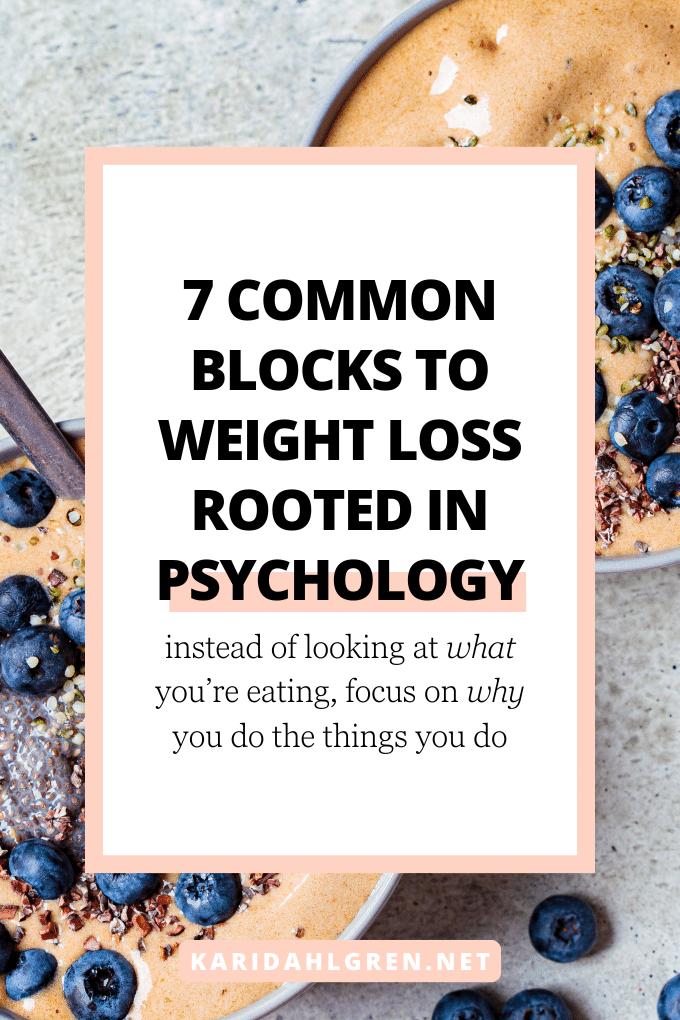
We’ve all been there before, counting calories and cutting out our favorite foods, only to find that diets often fail long term. The psychology of weight loss offers a different approach—focusing on mental and emotional well-being rather than just diet. If you’ve ever wondered, ‘What is my weight loss block?’ you’re already headed in the right direction. The true power lies in turning inward, not in another diet plan.
For those who don’t know me, my name is Kari and I’m an eating psychology coach specializing in a purely psycho-spiritual approach to making peace with food. I place the entire focus on the inner work because, in my experience, that’s where lasting progress is made.
In this research-backed article, we’ll explore common psychological blocks to weight loss that might be standing in your way. Every journey is unique, and my hope is that this article points you in the right direction while ultimately encouraging you to trust your intuition as the best guide.
Why Weight Loss Psychology?
Why should any of us care about weight loss psychology? Isn’t it just a matter of “calories in, calories out”? While that was once considered the standard approach to weight loss, emerging studies consistently show that restrictive dieting doesn’t work in the long term. Let’s take a look at how dieting goes against our biology to foster motivation to address the psychology of weight loss.
A study published in American Journal of Physiology found that the body’s biological response to dieting triggers persistent adaptations that drive weight regain, making it a truly uphill battle to maintain weight loss over the long term.[1]
Another study published in Obesity Reviews found that dieters tend to regain one-third to two-thirds of lost weight within a year, and nearly all is regained within five years.[2] Researchers also found that one-third of dieters regain more weight than they initially lost—a phenomenon called “weight overshoot” that’s demoralizing and frustrating, to say the least. The body is simply hard-wired to favor weight gain after weight loss.[3]
But if diets don’t work, what does? This is where the psychology of weight loss comes into play.
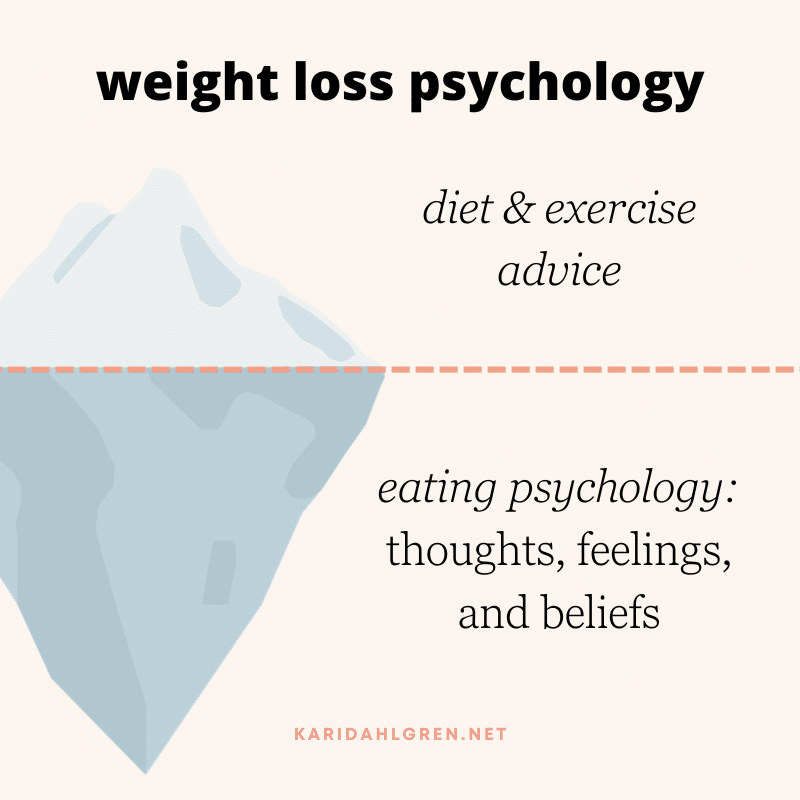
Just like the hidden part of an iceberg, your psychological landscape is vast and powerful, shaping your habits in ways you might not consciously recognize. Many people struggle with weight loss not because they lack willpower, but because the true blocks are below the surface, embedded in their psychology—out of sight but not out of mind.
Have you ever found yourself determined to lose weight, only to end up raiding the fridge at midnight? I’ve been there too, countless times. Dieting alone never resolved it for me. It was only when I delved into the psychology behind my eating patterns that I was able to break free from the cycle of yo-yo dieting and find peace with food.
Find your hidden strength: Even if you struggle with weight loss, we all have a strength around food, and I would love to help you leverage yours. Take my quiz to discover your eating psychology strength.
Mastering the Psychology of Weight Loss: 7 Common Blocks to Overcome
Now that you understand how restrictive dieting goes against your biology to make long-term weight loss very difficult, let’s turn our attention inwards. By exploring each potential psychological weight loss block, we can learn more about ourselves and, in the process, unlock the path to a healthier relationship with food and body.
Here are some of the most common weight loss blocks, backed by clinical evidence:
1. Food Rules
Short story: Restrictive diets often backfire by making us crave the very foods we try to avoid thanks to reverse psychology.
Most diets work through restriction. Some diets restrict calories in general while other diets restrict in more specific ways, like restricting macronutrients (e.g. no carbs) or cutting out particular types of foods (e.g. no sugar, no flour). However, this often backfires through reverse psychology.
Reverse psychology is a technique where you encourage someone to do the opposite of what you actually want them to do, often by suggesting that they are incapable of doing it or by discouraging the behavior you desire. When we make specific foods off-limits, reverse psychology takes hold. By telling ourselves that we can’t have a specific food, we end up wanting it more than before.
According to a study published in Frontiers in Psychology, selectively depriving yourself of certain foods, like chocolate, can actually increase cravings, particularly in those with a strong pre-existing desire for that food.[4] This means that if you have a strong preference for carbs or sugar, placing them off-limits will likely intensify your cravings even more.
Studies also show that restricting certain foods not only increases preoccupation with food, but it also increases the chances of binge eating too.[5], [6]
How to overcome this block:
Instead of rigid food rules, try embracing a more flexible approach that prioritizes both physical nourishment and mental well-being through mindful eating. This involves paying close attention to your body’s hunger and fullness cues, as well as the emotional triggers that might influence your eating habits. By eating without judgment and tuning into what your body truly needs, you can reduce the allure of “forbidden foods” and avoid the pitfalls of restriction.
When you give yourself permission to enjoy all types of food in moderation, you remove the emotional charge associated with them. This shift helps build a healthier relationship with eating—one based on balance, satisfaction, and self-compassion rather than restriction and guilt.
2. Psychological Deprivation
Short story: Deprivation leads to increased cravings and overeating, making it even harder to lose weight.
Deprivation doesn’t just apply to specific foods—it can also manifest as a general restriction of food intake. When we severely limit our overall consumption or ignore our hunger cues, our bodies interpret this as a threat to survival, which can trigger intense cravings and an eventual loss of control around food. A study published in the journal Appetite found that, the more you restrain yourself around food, the more likely you are to experience binge eating.[7]
Furthermore, deprivation significantly increases cravings and overeating, particularly in restrained eaters, according to a randomized controlled trial—the most rigorous type of clinical study—published in the International Journal of Eating Disorders.[8]
People who felt deprived ended up eating more chocolate than those who didn’t. This highlights how the psychological block of deprivation can sabotage weight loss efforts by intensifying cravings and the tendency to overeat.
How to overcome this block:
Rather than battling constant feelings of deprivation, ensure you’re giving your body what it needs to feel satisfied and content. This means eating enough food to satisfy your energy needs, instead of trying to eat as little as possible. Nourishing yourself appropriately allows you to redirect your energy towards understanding and overcoming the deeper psychological blocks that truly impact your relationship with food.
3. Tasty Foods
Short story: If you find yourself reaching for indulgent foods, your brain might be wired to crave “hedonic foods.”
We can’t discuss the psychology of weight loss without addressing how certain foods impact the brain. Hyperpalatable foods—those high in fat, salt, and sugar—activate the brain’s reward centers, increasing the desire to eat them. This phenomenon is known as ‘hedonic eating,’ where we eat for pleasure rather than hunger.[9], [10]
While eating pleasure is important and can support healthy eating habits,[11] it becomes problematic when it leads to eating beyond our energy needs, potentially impeding weight loss.
How to overcome this block:
Hyperpalatable foods are easier to overconsume but limiting them isn’t the solution. Instead, from a weight loss psychology perspective, it’s more effective to strengthen your ability to stop at comfortable fullness. If you struggle with this, it’s important to explore other potential weight loss blocks like emotional eating, which we’ll address next.
4. Emotional Eating
Short story: Unexpressed emotions can drive us to eat beyond fullness, making it difficult to recognize when we've had enough.
Emotional eating occurs when we use food to cope with feelings rather than to satisfy physical hunger. When emotions like stress, sadness, or anger are left unexpressed or ‘trapped,’ they can create an internal tension that food momentarily relieves. However, this relief is temporary, and it often leads to eating well beyond the point of fullness, perpetuating a common weight loss block.
This is where emotional tolerance, or distress tolerance, comes into play. Emotional tolerance refers to our ability to endure and manage uncomfortable emotions without resorting to avoidance behaviors like emotional eating. A study published in Eating Behaviors found that individuals with low distress tolerance were more prone to loss-of-control eating, where they continue to eat despite feeling full or knowing they should stop.[13]
How to overcome this block:
To overcome the block of emotional eating, it’s essential to develop skills that help you process emotions in healthier ways. One effective approach is my Stop, Drop, & Feel® technique, which encourages you to pause when you feel the urge to eat emotionally, drop into the present moment, and fully feel the emotions you’re experiencing.
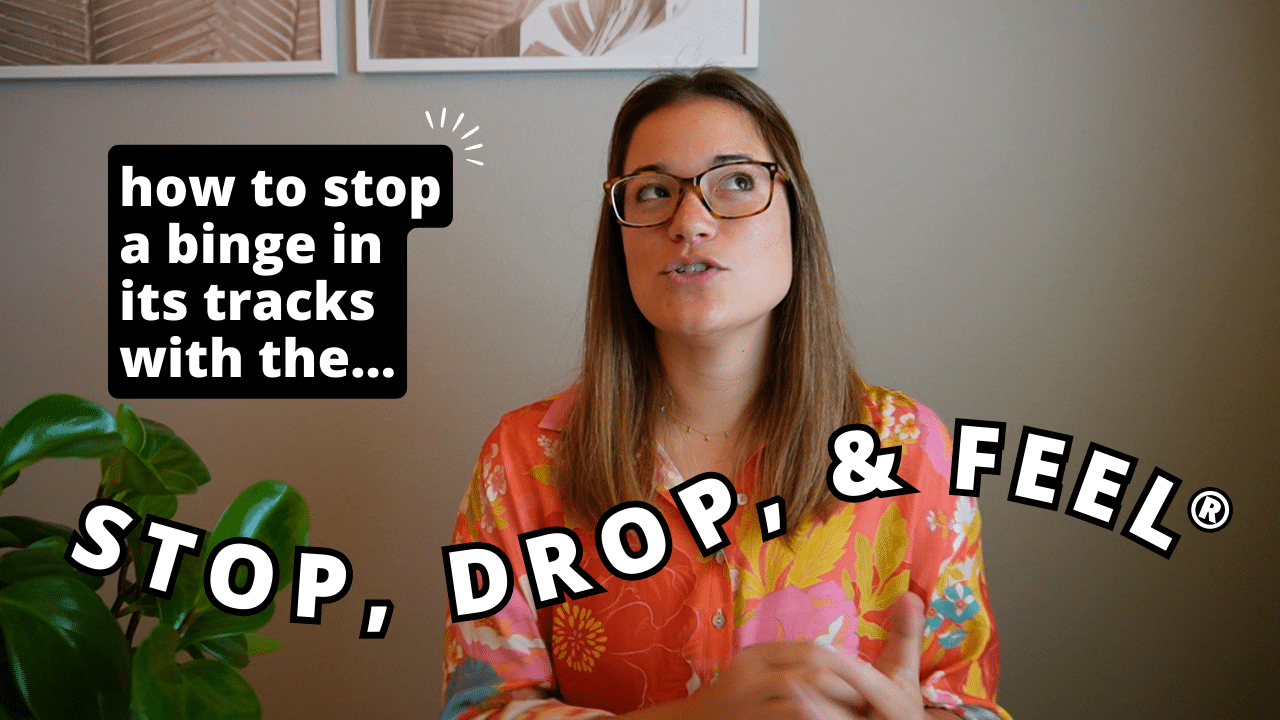
By acknowledging and sitting with your emotions instead of avoiding them, you begin to build emotional tolerance. This breaks the cycle of emotional eating by addressing the root cause—unexpressed emotions—rather than just treating the symptom. Over time, this strengthens your ability to recognize and respond to true hunger and fullness cues, which is essential for mastering the psychology of weight loss and breaking the cycle of emotional eating.
It’s about so much more than food: If you’re warming up to the idea that psychology is far more powerful than food, be sure to grab a copy of my free ebook, The Spiritual Seeker’s Guide to Stop Binge Eating. It explains my psycho-spiritual approach to making peace with food without dieting ever again.
5. Stress
Short story: Stress not only makes weight loss harder, but it can also lead to cravings for unhealthy foods, creating a vicious cycle.
After understanding how emotional eating can create barriers to weight loss, it’s important to recognize that stress is another psychological factor that can make weight management even more challenging. When we’re under stress, our bodies go into survival mode, releasing cortisol—the stress hormone—that can actually make it harder to lose weight.
What’s particularly interesting is that the stress of dieting itself can contribute to this problem. Studies have shown that even the act of counting calories, regardless of whether you’re actually restricting your intake, can elevate cortisol levels, amplifying stress and making weight loss even more difficult to achieve.[14]
This increase in cortisol doesn’t just make it difficult to shed pounds; it also heightens cravings for hyperpalatable foods—those high in fat, sugar, and salt, like chips, sweets, and baked goods.[15] Therefore, if you’re trying to lose weight while under stress, you’re likely fighting an uphill battle. The more stressed you are, the more your body resists weight loss, and the more likely you are to reach for comfort foods that only compound the problem.
How to overcome this block:
Cognitive-behavioral therapy (CBT) is a powerful tool for stress management, both in the context of weight loss psychology and for better overall well-being. CBT helps with identifying and altering negative thought patterns and behaviors, promoting healthier emotional responses and coping strategies. A study published in the European Journal of Clinical Nutrition explored the effectiveness of CBT in weight maintenance, finding that women who engaged in CBT were not only more successful at maintaining their weight but also continued to adopt healthier habits.[16]
Another way to manage stress is with relaxation techniques. A study published in the Journal of Molecular Biochemistry found that participants who practiced stress management techniques, including relaxation, experienced significantly greater weight loss and improved mental health compared to those who didn’t.[17] These strategies aren’t just for weight loss; they are valuable tools for basic self-care, enhancing both your mental and physical well-being.
6. Social Dynamics
Short story: Other people can influence our eating habits, especially when we feel compelled to eat when we aren’t hungry to evoke positive feelings in others.
Social dynamics play a significant role in the psychology of weight loss, often complicating our efforts to manage our eating habits. Many of us find ourselves eating past fullness, not because we’re hungry, but because it seems to make others happy. Whether it’s indulging in a slice of cake at a family gathering or ordering dessert on a date, the desire to please others can override our own signals of hunger and fullness—a phenomenon known as the “social facilitation of eating.”
A review study published in the journal Physiology & Behavior found that people consistently eat more around friends and family than when alone.[18] Keep in mind that enjoying food over social connection is a catalyst for healthy eating habits, according to a scoping review on eating pleasure published in PLoS (Public Library of Science) One.[11] Eating socially isn’t the problem—eating beyond fullness due to social pressure is where the weight loss block emerges.
How to overcome this block:
To overcome the block of social dynamics, mastering the art of saying no is essential—especially under pressure to eat in social settings. Many people struggle with this out of fear of disappointing others or seeming rude. However, politely and confidently saying no is crucial for maintaining your boundaries around food. Practice assertive communication with a simple, “No, thank you, I’m not hungry right now.”
If this sounds difficult, it could indicate a need to work on emotional tolerance to develop resilience to peer pressure and uncomfortable emotions that may arise when saying no. The Stop, Drop, & Feel is good for more than just stopping emotional eating; it can give us the emotional resilience we need to honor our needs regardless of how it makes other people feel.
7. Limiting Beliefs Fuel Self-Sabotage Around Food
Short story: Limiting beliefs can create powerful, often subconscious, blocks to weight loss by making the struggle with food more appealing than the success of reaching your goals.
As both an eating psychology coach and someone living in recovery from compulsive eating, I’ve seen firsthand how limiting beliefs can sabotage even the best intentions around weight loss. One of the most insidious triggers for self-sabotage occurs when we subconsciously derive a greater benefit from struggling with weight loss than from actually achieving it. This might sound counterintuitive, but it’s a common psychological weight loss block that many people face.
For instance, if you place a high value on evoking positive feelings in others, you might find yourself consistently overeating in social situations to please those around you. In this scenario, the benefit of making others happy outweighs the perceived benefit of weight loss. Much of this occurs subconsciously though, creating a frustrating cycle where good intentions are undermined by self-sabotage.
How to overcome this block:
To overcome the block of limiting beliefs, it’s essential to first uncover and understand the subconscious motivations driving your behaviors. Much like an iceberg, the deeper, unseen layers often have a more significant impact on your actions than the food on your plate. It’s crucial to explore what lies beneath, because you can’t heal what you can’t see. This is where my bestselling digital workbook, Why We Do the Things We Do, can help.
As famous author Joan Didon once said, “I don’t know what I think until I write it down.” Through juicy prompts and exercises, you’ll discover limiting beliefs that you may carry without even realizing it. Once you can see any limiting beliefs that are holding you back, you can start to break free from the cycle of self-sabotage around food.
Unraveling Weight Loss Psychology to Find Lasting Motivation
Finding motivation for weight loss is about more than just willpower; it’s about understanding the complex psychology that drives our behaviors. By recognizing and addressing the psychological blocks to weight loss that may stand in your way, you can begin to break cycles of self-sabotage and work towards a healthier, more balanced relationship with food.
In my personal philosophy, I believe in elevating your psychological and spiritual houses and allowing the physical body to follow suit. If you’re ready for a dramatically different approach to health and well-being, check out my freebies below:

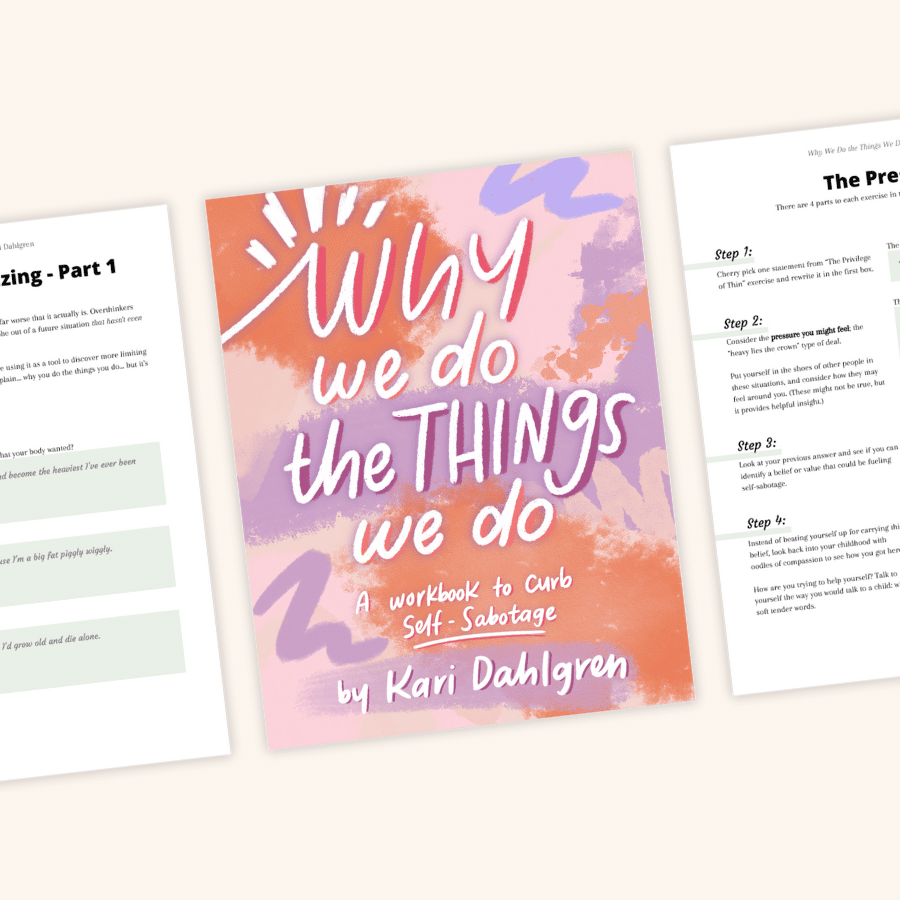
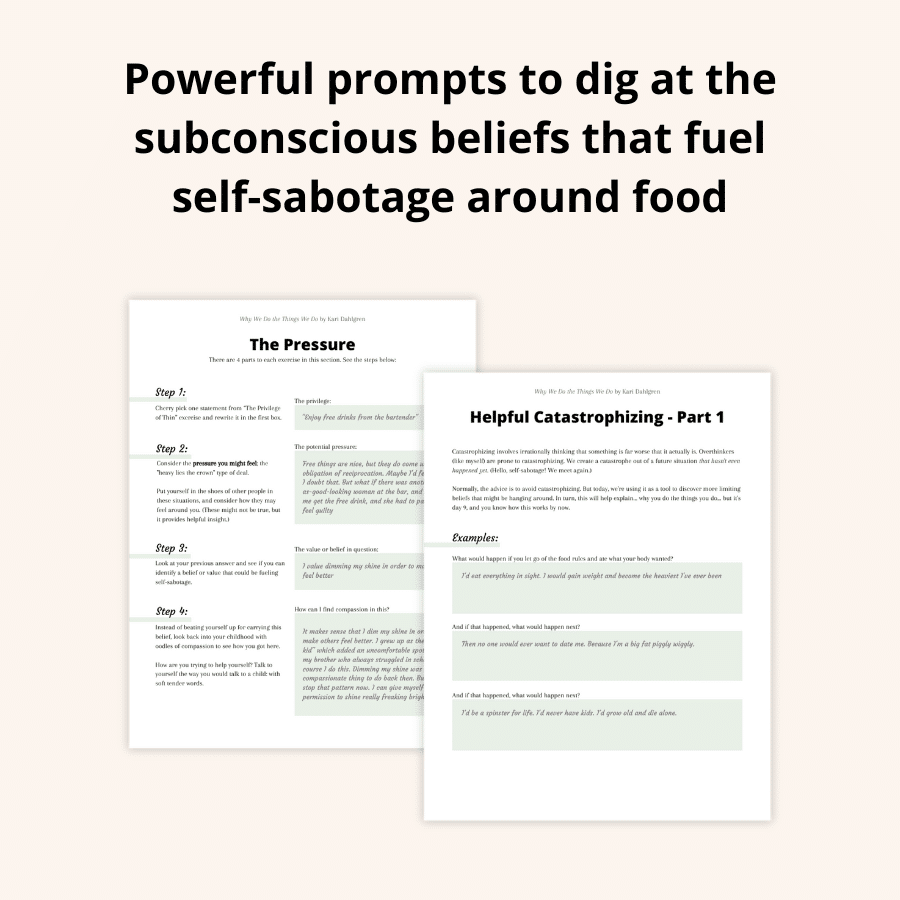



Great tips! A TON of reflection. Ouch! Very insightful. Thx for sharing. 🙂
I just finished writing 3 bullets in my journal: things to do once I’m skinny????, things that bring me joy outside of food, and my tracker of food & feelings for the day! Thank U! Now, I’m #teamtired but I’m gtb realizing a MAJOR step I made today in the psychology of eating!????
OMG you are adorable! I am so happy that you actually did the Food Feelings journal. A lot of people hear that advice and barely anyone actually DOES it, so good for you!!! You’re totally ready for change 🙂 that’s exciting.
Have just put step one into motion and ordered a copy of why weight off of eBay. Really like your post will refer back to it later Thankyou 🙂
Woo hooo!!! Awesome!!! I hope that book changes you life the way it did mine 🙂
Kudos to you for getting the book!
Really enjoyed your article and could not agree more. It’s refreshing when you read something written by someone who understands. The “foodie” part really hit home with me. I find WAY too much joy in food and eating. I will look into your suggestions and hope to see changes in the future.
Best of luck Natasha!
Wow. I now see losing weight through completely different eyes. Even though I´ve been telling myself not to, I´ve always counted my calories or focused on the number on that scale. The thought of not being allowed to eat or do things has always surrounded me. But not once did it occur to me that it is my mind that needs to be changed. Thank you so much.
Oh Maxi, what a wonderful epiphany to have!! Diet culture does us no favors by ONLY ever talking about the surface level of food!
Giving up being a foodie out going to be a rough ride!
Ohhh but you don’t need to give up being a foodie for any of this to work. In fact, enjoying delicious food is highly encouraged!
Thank you for this delightful article I have been really struggling with what has been stopping me from losing weight and getting healthy it’s nice to know someone has thoughts about this dieting thing !!
Dieting ohhhh dieting. It kept me distracted and preoccupied for years and years. As many people here can relate, I’m sure! Glad I could help 🙂
This post makes me want to try it! Im going to order the work book! Although I feel that it will be hard for me to not think in a diet mentality, I will do my best!
Thanks Madison! I have no doubt that you will have a breakthrough once you put pen to paper. I could not believe the words that came out of my mouth (or rather, what came onto my paper) once I started writing in it myself. It is crazy how the conscious mind blocks out so much. Good luck, and let me know what you think!
So here is my first share. I am 58 years old and being overweight my whole life has completely ruined my life. I have been waiting to get thin in order to start living. So, I will be ordering this book and committing to do the 15 steps outlined in this article. Thanks for all of the wonderful information.
Oh Beverly, this is a beautiful epiphany. I am sure there are many people who can relate to waiting until thinness to start living, myself included! I commend your commitment to start now!
WOW! I’m in shock and awe! I’m in shock because I’ve been on a diet (or bingeing while planning my next diet) for 30 years and it never freaking occurred to me that I didn’t have to be! I’ve gained 75lbs over the course of all those years and after many different diets and finally, after reading many of your posts and your e-book, I’m done! I’m free! I’m relieved! I’m excited!
I’ve read and studied countless books, articles, blogs and testimonials that never quite hit the nail on the head so I’m in awe at the way you’ve written and presented this information and that it has struck a chord within my soul. WOW! Thank you and thank you and thank you for your insight and sharing this invaluable perspective–it has changed me already and I can’t stop reading!!
Wow Gena, thank you for the most amazing compliment EVER. I am so glad that I could help you on this journey. It means a lot to me. I felt just as relieved as you once I realized that dieting wasn’t the answer. Cheers to freedom from diet culture!
This is the most valuable blog post I’ve read in a few years. I even saved it so I can read it again when I need inspiration. Thank you so much for encapsulating this in one clear, easy to read and understand place. I ordered Why Weight (I already love Geneen) and plan to take my growth in this area to a new level.
Thanks so much Tristan! I am so excited for you to do the workbook!!
Is there an audible book you can recommend on weight loss through psychology.
Also
Thank you for this post. This is me to a T.
Thank you so much
Perhaps you can find one of the books in audible format from my list of weight loss psychology books: https://karidahlgren.net/self-help-books-weight-loss/
Ordering the book now!!! I am 64 and have been fighting my weight on and off since I was 10. No more dieting. Ready to move forward!!! Thank you for giving me the first steps.
Love the commitment Teresa!!!
Hope finally get some clear concept what should need to be done. Thanks by the way.
Thanks for the comment Anisur 🙂
Very interesting. After the type 2 diagnosis, I lost about 50 pounds by really watching my carbs. Then I got good numbers, lost my sense of smell a year ago and started working from home six months ago. The weight is back. I am really going to study this to see if I can change my mindset.
I am sorry to hear what you’ve been going through Melodie. Losing your sense of smell sounds very tough, especially if you like food! I hope these steps are able to help with your ability to enjoy the other aspects of food, like feeling nourished and eating until comfortable fullness.
OMG you just made me realise that I am a foodie, but also that I spent so many years wanting vindictive revenge for all the things my mom said to me, not just as a child but as an adult too.
One thing I have noticed when I’ve managed to lose the weight, is that those who are thinner, suddenly start telling me I’ve lost too much weight, it’s like they’re scared that you’ll look good and they sabotage your efforts and make you feel bad about yourself. Sure fire way to get someone to eat is to make them feel bad about themselves.
Hi Mary! You really hit the nail on the head with this one. I hear things like this A LOT. People seem to try and bring others down when they begin to shine really bright. And the best thing we can do for ourselves is continue to shine no matter how uncomfortable it makes someone else. Keep shining!!!
Seriously woman. Searching for depth scrolling through Pinterest. I can’t wait to dive in now that I’ve found THE REASONS I’ve been stuck. Thank you a million. Already.
LOL! I was almost tempted to shorten this because it’s so long, but now I won’t! Thanks Shannon 🙂